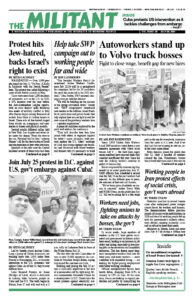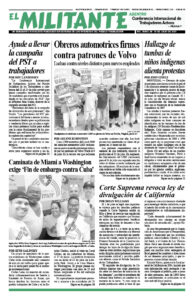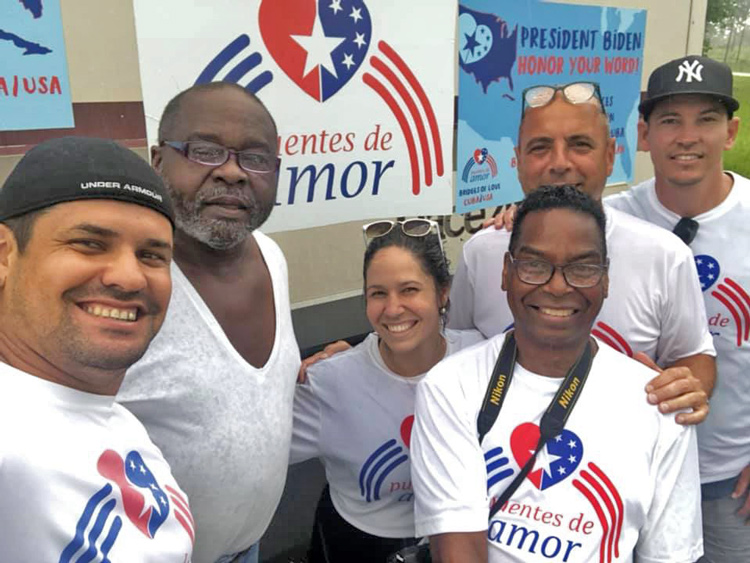Led by Seattle school teacher Carlos Lazo, a group of Cuban Americans are walking more than 1,000 miles from Florida to Washington, D.C., to broaden opposition to the U.S. economic war against Cuba. As of July 13, they’re over halfway there.
Lazo founded Puentes de Amor (Bridges of Love), which is dedicated to making links between people in Cuba and the U.S. The walk began in Miami June 27 and will end with a 2 p.m. rally in Lafayette Park in front of the White House July 25.
The day after the rally Lazo plans to turn in over 25,000 signatures on a petition to President Joseph Biden, urging him to end the sanctions on Cuba.
Building and joining the July 25 action is especially important in the face of a provocative call by right-wing Miami commentator Alexander Otaola for a counterprotest in D.C. Otaola hails the recent protests against electricity outages, high prices and shortages in Cuba, and claims the majority of Cubans in the U.S. support the embargo. But that’s simply not true.
In a July 11 statement, Lazo commented on the actions of a few thousand people that took place July 11 in Havana and other parts of Cuba expressing discontent with the difficulties and challenges there, which were manipulated by U.S.-backed opponents of the revolution. (See article page 7.) Supporters of the revolution also took to the streets across the country.
US embargo: create hunger, despair
Lazo quoted from an April 1960 memorandum by Deputy Assistant Secretary of State Lester Mallory that recognized “the majority of Cubans support [Fidel] Castro.” It said the only realistic policy to overthrow the revolution was to create “economic dissatisfaction and hardship.” It advocated attempts to make “the greatest inroads in denying money and supplies to Cuba, to decrease monetary and real wages, to bring about hunger, desperation” and hopefully “overthrow of government.”
This began the over 60-year-long embargo, maintained and expanded by every U.S. president since, Democrat or Republican.
“That’s right there. That’s no secret to anyone,” Lazo said. “We will continue to advocate that the sanctions that weigh on the Cuban people are lifted.”
Cars and vans are being organized by the New York-New Jersey Cuba Sí Coalition to participate in the rally outside the White House. They will also join a 12:30 p.m. car and bike caravan against the embargo prior to the rally, organized by the DC Metro Coalition in Solidarity with the Cuban Revolution and others.
The embargo of Cuba aims to overturn the first, and so far only, socialist revolution in the Americas. Washington has never forgiven workers and farmers for overthrowing the U.S.-backed dictatorship of Fulgencio Batista on Jan. 1, 1959, and going on to take power into their own hands, led by Fidel Castro and the July 26 Movement.
The Biden administration has so far maintained the more than 243 measures imposed by his predecessor, Donald Trump, that deepened the impact of the embargo — despite Biden’s promise during the 2020 campaign that he would lift some of them. On July 12 Biden cynically proclaimed, “We stand with the Cuban people,” but said not one word about lifting a single U.S. economic sanction.
Lazo and his fellow marchers are talking to everyone they meet along the way — from workers and farmers and small-business people to religious leaders and elected officials, regardless of their party affiliation or view of the Cuban Revolution — about why they should call for ending the embargo. They invite them to join the walk, to set up meetings where the group can speak and to come to the rally in Washington.
Learning about struggles in U.S.
On July 7 they were welcomed at the Federation of Southern Cooperatives by Executive Assistant Eboni Thomas and Terence Courtney, director of Cooperative Development and Strategic Partnership.
The federation was founded in 1967 out of the struggles by farmers in the rural South, part of the civil rights movement. Courtney said that the U.S. sanctions on Cuba had made it difficult for the federation to establish the relationships they wanted to with Cuban cooperatives. “It’s immoral to strangle a whole nation in the name of the free market,” Courtney said.
“Through this pilgrimage to Washington, we are meeting many people from civil society who are involved in struggles that we are learning about,” Lazo told them. “In south Georgia, we met a farmer, Willie Head, who taught us how African American farmers have lost their land over generations through denial of loans and credit and outright discrimination by the U.S. government.”
Lazo said that when he was growing up in Cuba, his mother told him about one of the highpoints of the struggle for civil rights. She described how marchers protesting Jim Crow segregation were brutally attacked by cops when they attempted to cross the Edmund Pettus Bridge in Selma, Alabama, in 1965. “That’s where I got the name for our organization, Bridges of Love,” he said.
About 25 people attended a celebration with marchers campaigning against the U.S. embargo in Atlanta’s Candler Park that evening.
“We have been educating communities about why we are fighting for the lifting of the embargo, but in this journey we also learn about other causes that we were not very familiar with, and we realize how interconnected we are in this world, and how we have to fight together,” Lazo told the group.
An appeal was made by Bernardo Gomez, one of the event organizers, for contributions to the Syringes for Cuba campaign. This helps to ensure that Cuba can inoculate the entire population against COVID-19 with Cuban-developed vaccines. Over $425,000 has already been raised.
Some 20 people heard Lazo speak at a meeting hosted by the Peace Church of Christ in Greensboro, North Carolina, July 12. Lazo described his own experience in the U.S. army in Iraq and condemned those calling for U.S. military intervention in Cuba.
By July 19, Lazo and the group will be in Richmond, Virginia.
If you would like to organize an event for Lazo and Puentes de Amor on their way to D.C. write him at porcuba1@yahoo.com.
For more information on the July 25 events, contact the DC Metro Committee in Solidarity with the Cuban Revolution at dcmetrocoalitionforcuba@gmail.com or (202) 503-9465.
Rachele Fruit in Atlanta contributed to this article.


